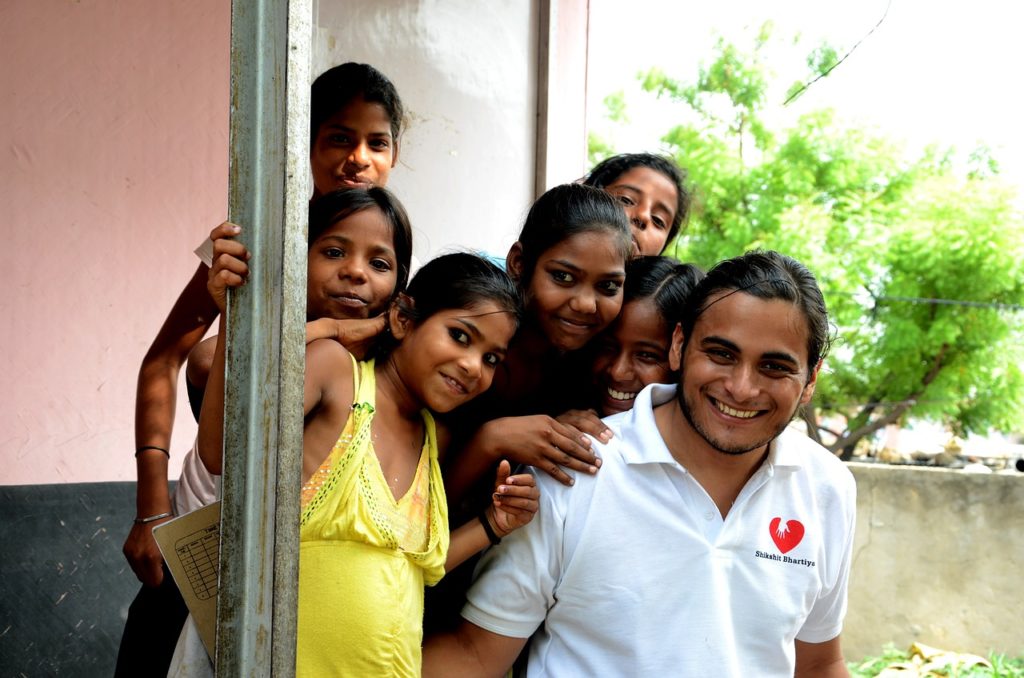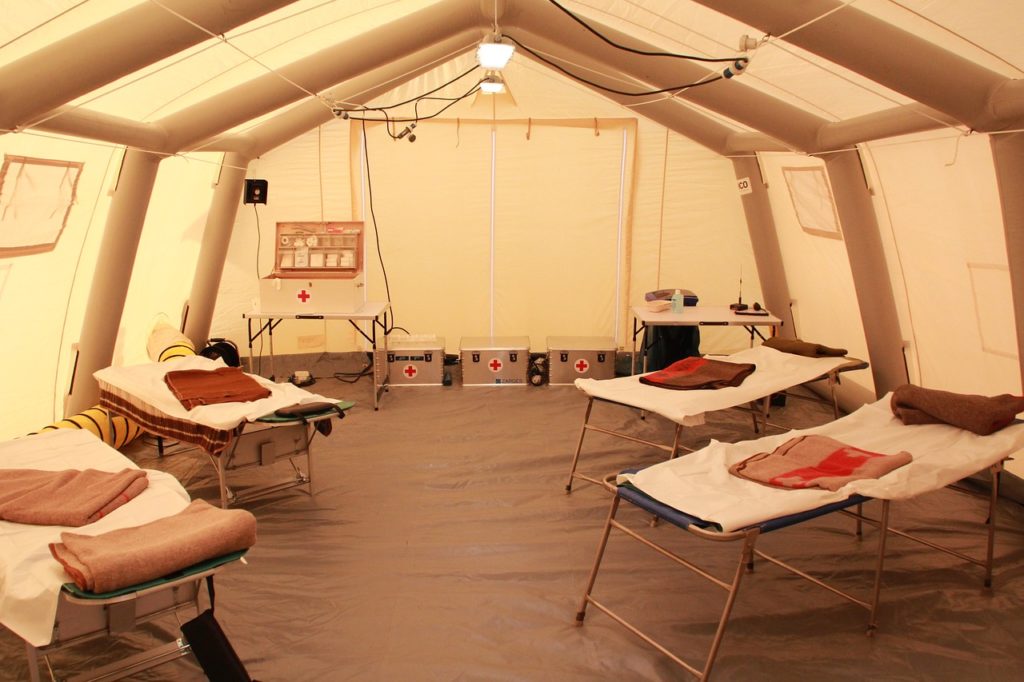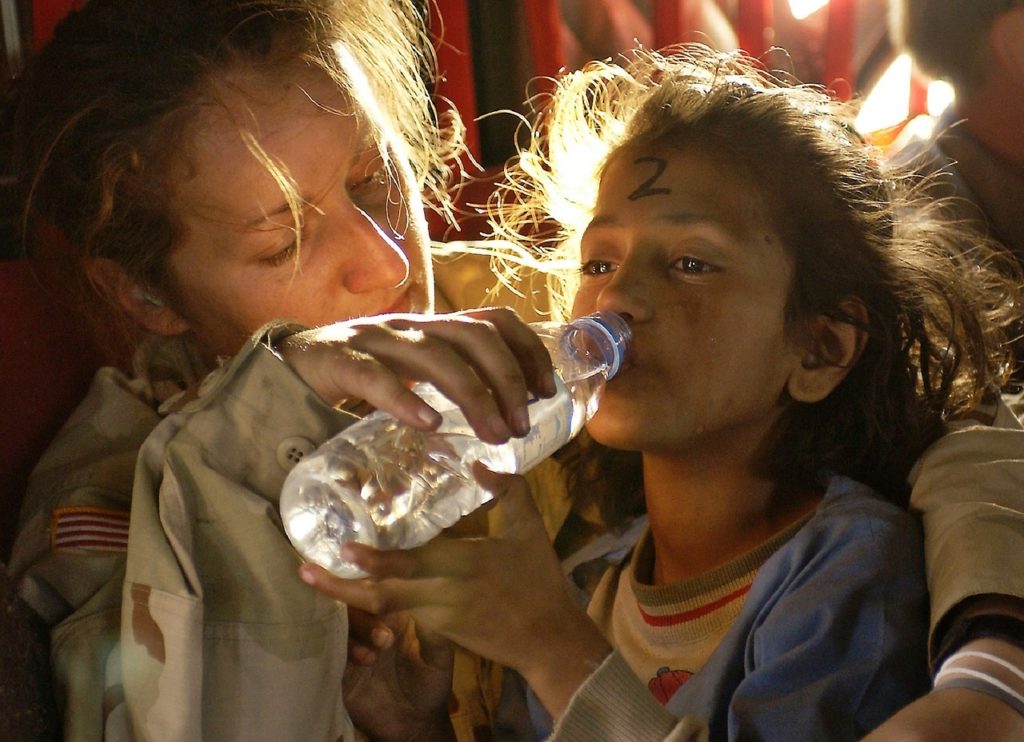International public health jobs are a growing sector of the professional market, with public health professionals becoming more in-demand as globalization makes the world smaller. Events in one nation – be it natural disaster, pandemic, or civilian casualties of war – impact many other nations, from refugees in neighboring states to disruption of international markets. That’s why public health is no longer a local or even national concern – it’s a global concern, and global public health professionals are essential.
Featured MPH Programs
Ranking the Top 10 International Public Health Jobs
There are so many career options for public health professionals, it’s hard to narrow down to a manageable ranking. Global public health jobs include every segment of the field, from medical professionals to managers, educators to executives. Experts in global public health, whatever their particular discipline, may find work in any number of organizations:
- Government agencies (in the US and abroad)
- International organizations (such as the WHO)
- Private research and academia (universities and think tanks)
- Faith-based charitable groups (like World Vision)
- Industry, banking, and finance (like the World Bank)
- International charitable foundations (like the Gates Foundation)

In the era of globalization, the playing field for global public health is constantly shifting; in recent years, for instance, global health has seen groups like ActionAid, Oxfam, and Amnesty International (some of the largest relief organizations) concentrating more of their operations in Africa. While international aid has long been seen as “charity” from the First to the Third World, 21st-century global public health is seeing the formerly colonized taking control of their destiny, with the developed world providing support.
Make no mistake: working in the field as an international aid worker, humanitarian, and public health professional can be very dangerous. Global public health jobs expose workers to the risk of illness, terrorism, disasters, and accidents; on the other hand, constant travel, stress, and overwork are far more common than any of the others. For all the dangers, though, experts in global public health are some of the most dedicated, experienced, and well-educated people in the world, cosmopolitan and comfortable in the most distressing and alarming settings. It takes a special person to work in global public health, and MPHOnline salutes them.
MPHOnline’s ranking of the Top 10 International Public Health Careers brings students, public health professionals, and career-changing adults information about the best-paying, most in-demand global public health jobs. Recent graduates, or current MPH in Global Health students, should also make the most of their institution’s network of partners and alumni, as well as checking out the employment listings for major organizations like the CDC, the United Nations, and groups like Amnesty International.
Jobs are ordered according to median salary expectations, sourced from the CDC, the Bureau of Labor Statistics, Payscale, and Glassdoor.
1. Policy Analyst

Governments play a crucial role in global public health, but the health and well-being of billions of people around the world cannot be left up to politicians alone. After all, hunger, disease, and natural disasters last much longer than the average election cycle, and the effects of public health crises go on for generations. That’s why policy analysts are such important international public health jobs, making the public health system function on a global level. Policy analysts study programs and their effects on communities, standing between government and health organizations to make sure government regulations and policies help, rather than hinder, the work of global public health. They report findings to their government, interpret law for organizations, and keep the big picture in mind at all times.
To take on a career as a policy analyst, a public health professional will need at least an MPH in Global Health, and possibly a Doctorate in Public Health to reach the highest levels of authority and influence. In many cases, a public health degree may be earned alongside a political science degree, for a thorough knowledge of the political system. As in other global public health jobs, a high level of education must be combined with many years, even decades, of experience, whether it is a broad experience in many different areas and communities, or highly specialized experience – the experts who know everything there is to know about a particular situation or community. For that expertise, Global Health Policy Analysts can expect to be well-paid, depending on where they are placed, their organization, and their title.
Median Pay: $114,290
2. Epidemiologist

An epidemiologist really exemplifies what public health and global health do; everything that we know about infectious diseases, all of the key information necessary for understanding and fighting epidemics and pandemics, is due to epidemiologists. Epidemiologists are tasked with researching and analyzing patterns of disease, using biostatistics, observations, and even interviews to understand how diseases pass through a community. They design research studies and report their discoveries to the people who lead the public health system: government, healthcare workers, and the public. Working in the field, they expose themselves to great risk in order to protect and heal people.
Epidemiology is a highly technical field that requires much education; however, demand for epidemiologists in the global health field are so high that many researchers and health workers are switching to epidemiology to meet the need. The minimum education for becoming an epidemiologist is a master’s, generally an MPH in Epidemiology, but for leadership positions, a Doctor of Public Health or PhD in Public Health is strongly recommended. International public health jobs in epidemiology may work under the government, for humanitarian organizations, or in universities and research centers, and while pay depends on where an epidemiologist works, a well-placed, highly experienced epidemiologist can make well over six figures.
Median Pay: $104,680 (CDC)
3. Medical Officer

In all of the red tape and bureaucracy of global health, it’s easy to forget that health is the foundation of it all. Big agencies and organizations have a tendency to become institutionalized, and become focused on merely keeping their existence going, but medical professionals are the heart of global public health, and among the most important international public health jobs. Medical officers and workers include professionals ranging from doctors, nurses, and midwives, to PAs and medical technicians. At the highest levels, Medical Officers manage programs and staff in healthcare facilities and in the field, while also providing useful medical consulting to the policymakers and administrators who may have no medical training at all. Global public health does not work without the doctors and nurses who know how to treat patients.
Medical Officers, at least to work for major organizations like the CDC, will need to earn their MD or another doctoral degree (such as a Doctor of Nursing Practice or a DPH) to reach the highest levels of leadership. Those high levels require a high level of responsibility, including management, overseeing training programs, offering medical advice and leadership, and making sure that the organizations they work for stay ethically and legally clean. Pay, just like pay for any doctor, is high, with the highest rates for the CDC (requiring at least 5 years of experience) reaching well over $130,000 per year.
Median Salary: $104,680 (CDC)
4. Program Management and Advising

When it gets down to brass tacks, global public health is a bureaucracy, and a bureaucracy runs on administrators. At any given time, an organization like Oxfam or Amnesty International, or a major intergovernmental organization like the United Nations, has a staggering number of projects going on. Those programs need managers, making Program Management one of the main international public health jobs available to professionals working in global health. Managers are responsible for the short and long-term strategies, implementing plans based on the advice and insights of epidemiologists, medical officers, and policy analysts. They set standards, make sure aid workers are properly trained, and keep their projects in compliance with regulations and ethical standards. In other words, they’re the jugglers.
While entry-level international public health jobs in management (such as assistants and support) may require only a bachelor’s degree, taking on higher-level global public health jobs in management will require at least a master’s degree. There are many MPH in Health Policy and Management degree programs today, training students for precisely this kind of career. Managers are needed everywhere, from NGOs to government to faith-based charities, making it one of the broadest careers in global public health, and one of the most in-demand; job growth is estimated at as much as 20% in the next decade. Pay is high as well; UN Humanitarian Affairs Officers, for instance, make as much as $113,000-$128,000, depending on experience and title. Even among managerial international public health jobs in general, median income is in the $90K range.
Median Pay: $96,540
5. Health Scientist

While epidemiologists may get the most attention, there are a host of health scientists who do the research that fuels global public health. From direct research in the field to laboratory studies to community interviews and surveys, health scientists are finding solutions to the public health problems that plague humanity on a global scale. Health scientists are responsible for conducting studies, analyzing results, developing new methodologies, and cooperating with government and NGOs to communicate their findings. Among global public health jobs, the health scientist is the most in the background (except for the very few who become public intellectuals, appearing in the media), but it’s the career that is most crucial to finding new ways to help.
To work as a health scientist, you will need at least a bachelor’s degree in a scientific field, such as biostatistics, a social science field, or in public health. A master’s degree and a history of experience will make a big difference on the job market, however. The field, and the experience, depends entirely on where a health scientist wants to work, whether in the field, in a laboratory, or in an academic position. Many health scientists work in academic settings or for private research centers, often with grants from the government or organizations like the Gates Foundation, but many others work directly for organizations like the CDC or UN. For health scientists who work for an organization like the CDC, median salaries can approach or pass $100,000, though salary will vary in government, higher education, or other settings.
Featured MPH Programs
Median Salary: $94,581 (CDC)
6. Public Health Advisor

“Public Health Advisor” is a bit of an amorphous job title, but think of it as the experienced and wise figure who works to keep organizations aware of the long view, providing the connection between all of the many moving parts of any complex public health undertaking. An advisor is not precisely a manager, making sure every member of the team does their job; rather, the job of a public health advisor is to synthesize all of the research, policies, regulations, and actions of the various programs to make sure that projects stay on target. They coordinate with partners to develop strategies for taking on the issues at hand. A public health advisor, most importantly, knows what is at stake and keeps their organization from losing sight of the matter at hand – improving health around the world in a practical way.
An international public health job like Public Health Advisor can take many forms, depending on the agency or group the advisor works for; advisors may work steadily for one group, or work more as free agents in a consultant style. For the most part, the minimum education required for a global public health job as an advisor will be an MPH, though many years of experience or a Doctor of Public Health will make more of an impression (and lead to higher salaries. Public Health Advisors working for the CDC, for instance, the median approaches $90,000, but salaries of well over $110,000 are available for higher-ranking advisors.
Median Salary: $88,650 (CDC)
7. Field Consultant

The true operations of the global public health system take place in the field, directly in the communities affected by disease, pollution, natural disasters, and war. While some workers in the field are permanently placed, many, many more are volunteers or temporary workers. With any new undertaking, it is absolutely critical to have a field consultant who knows the area, knows the community, knows the local laws and customs, and knows how organizations can do their jobs best, first-hand. Consultants must also examine and analyze how organizations are functioning for efficiency, cost management, and effectiveness. They may be hired from outside as independent consultants or from a firm, or they may be employed directly by an organization, but the field consultant is a key international public health job.
It’s hard to really pin down the education level and salary of a field consultant, because the work, and the organizations the work is done for, vary so widely. As a general rule, a professional will not be hired, or taken seriously, as a field consultant without extensive experience actually working in the field, regardless of education level. Field consulting, after all, is as much a matter of first-hand knowledge and connections as formal education. An MPH would be a good place to start; Field Consultant is not an entry-level international public health job, after all. Public health professionals who do not have an MPH, but who do have ample experience, may consider getting an accelerated MPH or taking an accelerated online program if they want to move into consulting; a Doctor of Public Health may give workers an even stronger position on the market.
Median Pay: $81,330
8. Disaster Relief Support Technician

Events in the 21st century – including a rise in terrorist activity, increased natural disasters, and man-made emergencies – has made disaster relief management one of the fastest-growing international public health jobs in the world. On a global level, Disaster Relief Support Technicians are necessary professionals addressing the problems that arise in the aftermath of a disaster, especially in economically depressed and unstable regions that suffer the most. Disaster relief professionals are involved in all levels of public health, from government to charitable organizations, and they incur a great deal of risk even if they are not on the front lines of a disaster.
Because disaster relief has become one of the most important global public health jobs, colleges and universities across the US are working to implement disaster management MPH programs. A specialized MPH is quickly becoming the standard for employment in leadership positions, though many of the lower, entry-level international public health jobs may require less education. Stats for disaster relief salaries show lower median rates than other careers. However, those working for relief organizations in international settings may find their salary opportunities substantially higher than those working stateside, considering the added dangers and red tape of international aid. Disaster relief technicians working in especially dangerous areas can expect to make considerably higher than the average American disaster relief professional.
Median Salary: $54,515
9. Global Health Educator

When it comes to the global public health jobs that have the most direct impact on people, health scientists perform research and help create solutions; medical professionals provide on-the-ground care to patients, implementing those solutions; and public health educators make sure that the people of the community have the knowledge they need to find treatment, get well, and prevent disease. Global Health Educators are the crucial link between the science and the community, helping communicate directly with the people. It’s an international public health job that requires a great deal of compassion and empathy, along with cultural understanding, language and communication skills, and strong networking skills. After all, global health workers can’t help where they are not trusted, and winning the people’s trust is the biggest job of Global Health Educators.
Global Health Educators may work for any number of nonprofits, international aid organizations, or government agencies, but before they can get there, a bachelor’s degree or master’s degree in public health is a must. Education can vary, though; public health educators may come to the field from many different backgrounds, including nursing, social work, or teaching. In many cases, a master’s degree in one of those fields combined with an online public health certificate may be the right path to working in public health education. In the US, the median pay for a public health educator is in the mid-$40K per year, but, as with disaster relief, the increased risk of some international settings may increase salary expectations considerably.
Median Pay: $44,200
10. NGO Aid Worker

Global public health is, above all, a job that takes place in the field. While decisions may be made by managers and administrators in offices in Washington (or the CDC in Atlanta, or the WHO in Geneva, or any number of other places), it’s the experts in the field who make things happen. Whether it is scientists doing research, care workers providing health services, or educators informing the public about prevention, every operation rises and falls on its field workers. Humanitarian workers come from all sorts of backgrounds, and work for all sorts of organizations: OxFam, Amnesty International, United Nations, and UNICEF are only a few of the largest, and the logical place to start for international public health jobs.
Education and salary expectations for humanitarian professionals can be extremely different from one organization to another, and one position to another. Related jobs, such as Humanitarian Affairs Officer, Humanitarian Aid Coordinator, and Humanitarian Aid Developer, have a wide range of salaries and education requirements, depending on managerial responsibilities and experience. Entry-level international public health jobs will probably require only a bachelor’s degree, and many graduates of global public health programs go straight into the field. If your goal is to work in international communities changing lives, humanitarian aid worker is the place to start.
Median Salary: Varies